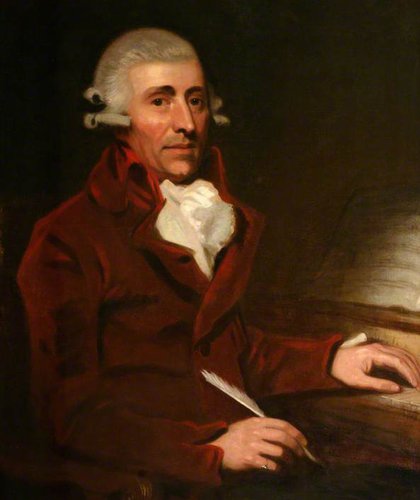
Joseph Haydn
Franz Joseph Haydn (1732-1809) Austrian composer, the first great master of Viennese Classicism was born in Rohrau, in Burgenland as the son of an ordinary wheelwright. His father, who also liked playing music, recognised his son's talent very soon. His parents first wanted Haydn to make a career in the clergy, however, his relatives convinced his parents to help him learn music. He was brought to the attention of the Kappelmeister of the Stephansdom in Vienna, who admitted him to the choir and school. In Vienna Haydn had the opportunity to learn about the new developments in music and popular composers. It was Nicola Porpora who taught him the fundamentals of composition. In 1759 he entered the services of Count Morzin as Kappelmeister of the orchestra in the Count’s court in Lukavec, Bohemia. In 1761 he was offered a job as Vice-Kappelmeister in the court of the Esterházy family. After the death of Johann Georg Werner he was promoted to Kappelmeister. He was in charge of the orchestra, the opera ensemble and composed chamber music for the Prince. From 1766 his employer spent more and more time in Eszterháza, which made Haydn isolated from the music life in Vienna. In the mid-1780s he got acquainted with Mozart, whose compositions he always highly praised and whom he greatly respected. In 1790 Prince Nicolaus I. passed away, so Haydn was given more freedom and became less isolated. He accepted the invitation of Peter Salomon, violinist and impresario, to London. Haydn's music was extremely popular in England, his concerts were roaring successes. It was during this time that he composed the first six of the 12 London symphonies. He returned to Vienna the next year in April, where he took young Beethoven as his pupil, who, however, eventually found another teacher. Haydn recognised the music talent of Beethoven and he praised him in public. He returned to London the next year, where he gave successful concerts and composed the last six of the London symphonies. The royal family made efforts to convince Haydn to settle down in England for good, however, Haydn returned to Vienna, where he spent the last years of his life. He composed his two German oratories The Creation and The Seasons, both were highly acclaimed. However, his health condition was gradually deteriorating, he suffered from rheumatism, which confined him to his house after a while. In 1809 he was depressed by the defeat of the Austrian army by Napoleon. On 26 May he suddenly fell ill and his doctor could not help him anymore. He died on 31 May. Haydn is considered one of the most formidable composers in the history of music. He is the father of the classical symphony and the string quartet, and he also renewed the sonata form.